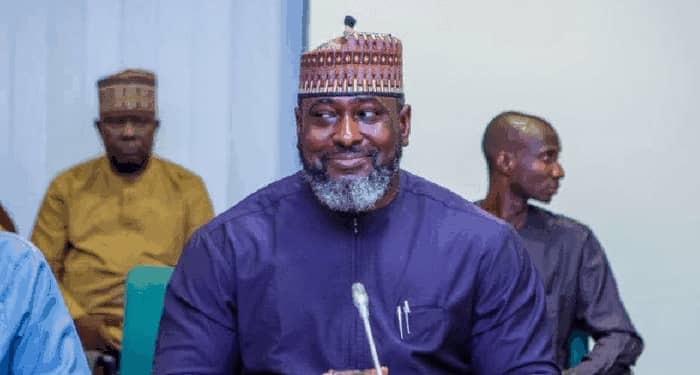The Nigerian Economic Summit Group has revealed how the Excess Crude Account containing $50 billion, was exhausted by state governors in 2010.
This fund, which could have acted as a buffer for subsidies and other national financial concerns, was shared among the 36 states, significantly depleting Nigeria’s financial safety net.
The Chief Executive Officer of NESG, Dr. Tayo Aduloju, disclosed this during a courtesy visit to the headquarters of PUNCH Nigeria Limited.
During his remarks, Aduloju recalled that Nigeria had built a robust fiscal buffer during the global financial crisis of 2007-2008, which shielded the economy from external shocks.
However, by 2010, state governors approached the Supreme Court to declare the ECA illegal, which allowed them to gain access to the funds.
Aduloju explained that between the death of President Umaru Musa Yar’Adua and the early months of President Goodluck Jonathan’s administration, the Federal Government disbursed the $50 billion from the ECA to the governors.
This decision drastically altered Nigeria’s fiscal operations, transitioning from a savings-based subsidy model to a revenue-based approach.
“Between 1999 and 2010, we operated a savings-based subsidy operation. In other words, we were paying for the subsidy from savings. We were not borrowing to pay the subsidy,” Aduloju explained.
He pointed out that the subsidy was paid directly from the ECA, which had accumulated significant reserves, particularly by the end of President Olusegun Obasanjo’s tenure when the account held over $60 billion.
However, this financial prudence was not sustained. According to Aduloju, the depletion of the ECA left Nigeria without adequate savings by the time Jonathan’s administration experienced an oil boom.
“Okonjo Iweala once told us we were broke. And her argument at that time was that a country cannot call spending all its money progress,” he said.
The situation deteriorated further under President Muhammadu Buhari, particularly in his first six months in office, when the price of crude oil plummeted due to the rise of shale oil production in the United States.
“Shale oil in the US crashed the price of crude oil to less than $22 a barrel, which is lower than the production cost,” Aduloju explained. “With this, every oil-producing country automatically entered deficit financing in oil production. Saudi Arabia defended its economy in 2015 with $45bn. But Nigeria didn’t have savings at that time because it had shared the savings among the 36 state governors.”
Aduloju noted that this shift left Nigeria in a precarious financial position, forcing the government to finance the subsidy through crude oil sales at a loss, plunging the country into a deficit that lasted throughout Buhari’s administration.
“We maintained this deficit position for eight years,” he added.
Reflecting on the challenges inherited by each successive government, Aduloju emphasized that while Nigeria has employed various fuel subsidy models since 1999, poor fiscal management has exacerbated the country’s financial crises.
“The subsidy removal that Tinubu inherited is not the same as the subsidy removal that Buhari inherited, and it’s also not the same as what Jonathan faced. They are different operations. But the consistent issue is that each mismanagement of our fiscal resources by previous governments compounded the problem for the next government,” he asserted.
Aduloju stressed that the core issue facing the current administration is not just the removal of the fuel subsidy but a lack of transparency in the government’s financial dealings.
He argued that without transparency, policy choices like subsidy removal will be superficial and won’t address the underlying issues.
“When President Tinubu took over, I insisted that what we needed was transparency before choices. Somebody should have first turned on the light and answered the simple question: what are we looking at? What is the size of the fiscal deficit? What were the commitments made in selling crude forward into the future? How much was committed? How much do we owe? How much of our reserves are encumbered?”
Aduloju also emphasized the deep trust gap between the government and the public, arguing that transparency is key to bridging this divide.
“Subsidy itself is not the problem. The challenge is that the lack of transparency does not allow for choices. Historically, Nigerians have agreed that subsidy is fraudulent. Where they disagree is whether what they would receive after the government removes the subsidy would be of commensurate or greater value.”
To tackle Nigeria’s economic challenges effectively, Aduloju pointed to the upcoming NESG at 30 Summit, scheduled for October 14-16, 2024, in Abuja.
He expressed confidence that the summit would address critical issues like fiscal transparency, subsidy management, and economic reform.
Acting Editor of The PUNCH, Oyetunji Abioye, welcomed the NESG team and affirmed the media house’s support for the summit.
He remarked that the vision of NESG aligns with that of PUNCH and that the company would assist in promoting the summit, starting with a press conference slated for the following day.
The NESG delegation included Chairman of the Media and Publicity Subcommittee for the 30th NESG Summit, Mr. Udeme Ufot, alongside Senior Communications Specialist Francis Jakpor, Associate Oluwatobi Abodunrin, and Executive Assistant to the NESG CEO, Biodun Shittu.
(PUNCH metro)


